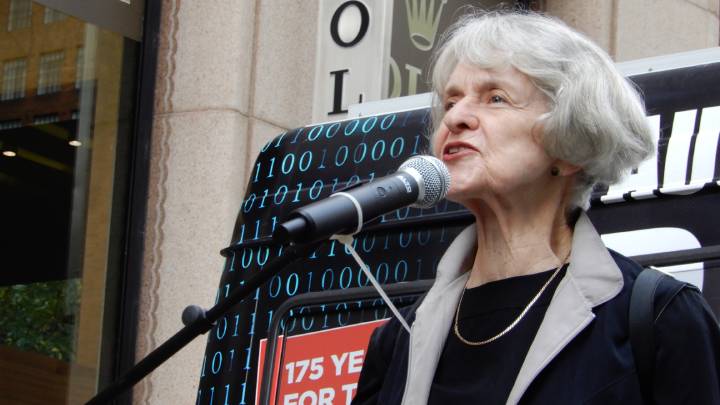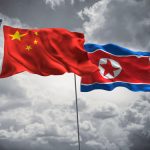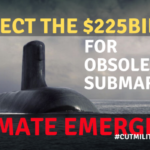“We Should Be Outraged”: AWPR’s Dr Alison Broinowski on the AUKUS Pact

“G’day,” said the prime minister as he addressed the nation on 16 September. Scott Morrison then went on to reveal that he’s been busy committing us to a tripartite defence alliance – known as AUKUS – which includes the US and the UK and is all about gearing up for war with China.
At the same time, the PM also announced the key detail involved in the initial stage of this “defence” pact, which is that we’ll be investing in nuclear-powered submarines, and in doing so, Morrison’s stabbed the French in the back by dropping a pre-existing submarine contract with them.
And if anyone fails to find this disturbing enough, then perhaps the Chinese response will suffice.
Beijing’s mouthpiece the Global Times stated in an editorial that “by pursuing a one-sided policy tilting toward the US in the China-US strategic game, Australia has turned itself into an adversary of China”, adding that the acquisition of nuclear submarines will only escalate this “confrontation”.
“However, no matter how Australia arms itself, it is still a running dog of the US,” the editorial continues. “If Australia dares to provoke China more blatantly because of that, or even find fault militarily, China will certainly punish it with no mercy.”
Going nuclear
Morrison further made clear that the US sharing its nuclear technology with Australia is “a very special arrangement”, and he explained that the eight submarines – which will have their own onboard nuclear reactors – will be assembled in South Australia.
While China has warned that this aspect to the AUKUS pact is particularly problematic, Malaysia and Indonesia have also raised their concerns that our country taking this route threatens to spark a nuclear arms race in the Indo-Pacific region.
Long-term nuclear activists have warned that this agreement will likely be used as a backdoor means to attempt to establish a broader nuclear industry in this country, especially with the growing push to drop the use of fossil fuels and the Liberal Nationals’ reluctance to embrace renewables.
Indeed, as he took office, federal resources minister Keith Pitt announced that he recommends investment in fossil fuels and nuclear energy as a means to lift local living standards. The minister said this in February 2020, as the last blazes of the summer bushfire crisis were still alight.
The war cabinet
Not only has the Morrison government been making all these decisions without any consultation of the Australian public, but, unbeknownst to many, the key decision on whether the nation commits itself to war continues to be in the hands of just a few ministers.
The ability to send troops into conflict is referred to as war powers. In this country, the National Security Committee of Cabinet makes the decision on whether we go to war. And at present, the war cabinet consists of Morrison, Joyce, Dutton, Frydenberg, Payne, Birmingham, Andrews and Cash.
Australians for War Powers Reform has long been campaigning for these powers to be the domain of the entire parliament.
Sydney Criminal Lawyers spoke to AWPR acting president Dr Alison Broinowski about the implications of the AUKUS pact and why she asserts that war powers reform is more vital than ever.

Firstly, out of the blue, the Morrison government has announced that it’s placed the nation in a newly created “enhanced trilateral security partnership” with the US and the UK.
And despite no mention of China being made, it’s a given that this pact targets Beijing.
Dr Broinowski, as a former diplomat and long-term advocate for Australian foreign policy independence, how does the AUKUS pact read to you?
It reads to me like complete contrary. For a start Australia is committed to enmity with China – which we don’t need and used not to have – for no particularly good reason. I find it absolutely impossible to understand.
Not only that, but I’ve also been trying to find the terms of this agreement and there’s absolutely nothing that tells me what’s in it. And I imagine other Australians are equally as puzzled.
The AUKUS pact was dropped on the nation after it was finalised. You’ve described the lack of transparency and accountability around it as “breathtaking”.
Can you talk about the implications of the government making such decisions in secret? And should we as Australians simply expect this?
All governments make treaties in secret. All governments make trade negotiations in secret. They do that because they don’t want to cause problems with the people they’re negotiating with. That I can understand.
But this is not a treaty. This is an agreement or a partnership. It’s an undertaking to have a partnership.
If this is a partnership, the Australian people need to know what it’s about, as there are all kinds of things that we don’t know.
Just leaving the whole business of the submarines to one side – although there’s a lot we don’t know about that, like the end price and the delivery date – what worries me is there was no more consultation about this agreement with Australians, than there was with the French.
We are in exactly the same position as the French government, and they’re outraged. We should be outraged too.
A key aspect to the pact formation is that Australia goes nuclear. This is in terms of a fleet of submarines. And whilst this is worrying in itself, it raises other concerns around the use of nuclear technology.
What are your thoughts on our country going nuclear, especially as no one consulted us?
This is part of a long-term strategy. There are people who have been advocating for years to get a nuclear industry in Australia. The idea was always that it would be in South Australia.
Several years ago, South Australia had an inquiry into these matters, and they decided against a nuclear power industry for the state. This seems to be the same thing by stealth.
In other words, they’re going to have us get nuclear submarines, and then they’re going to say, “Well, it doesn’t make sense for us to shift the uranium to some distant place to be refined, and then brought back to be used as fuel for our submarines. It would cost us much less to refine it here and have our own nuclear industry.”
Then they will say that we need nuclear powerplants. That’s what they’ve been looking for – not only the military, but also the mining people.
Again, there was no consultation with Australia for the very good reason that the government knows that most Australians are opposed to it.
On the day following the AUKUS announcement, defence minister Peter Dutton told reporters that more US troops are to be based and rotating through northern Australia. Beijing was cited during this press conference.
What are the potential implications of this sort of posturing by our nation?
It’s extremely provocative. China is not in a mood to be provoked at the moment.
In recent times, it’s been very clear under president Xi, that they have had enough of sitting quietly and doing what the rest of the world expects them to do, and then getting no praise for it.
They got no praise for their magnificent Olympic Games a few years ago. They received no praise for their achievement with containing the COVID virus and producing their own vaccine at a rapid time.
There has been no praise for the kinds of improvements that they’ve made for ordinary Chinese people.
Many of us would not wish to live under the Chinese Communist Party. But that’s not the point, it’s their country. And they have not been the aggressor anywhere in the world anywhere near the way the United States has been.
The other point that I’d like to add is that the timing is very strange, because here we are turning on China with this tripartite agreement, when the United States, the British and our nation have just left Afghanistan and retreated from a twenty year-long lost war.
Yet, we appear to be cranking up another potential war on China, which, I am quite confident, we would also lose.
This is all being done in the midst of a long-term pandemic and an even longer-term climate crisis that’s only just beginning to accelerate.
As a community, how should we take the government’s prioritisation of gearing up for a potential war over these more pressing matters?
I would hope that most Australians are shocked, outraged and oppose this with every means that they have, because the problem is they won’t be asked – as we are never asked – when it is the matter of war.
Anyone who reads letters to editors realises that 70 percent plus of Australians want action on climate and we are not getting it. And 80 percent plus of Australians want us to change the way we go to war.
So, there are a lot of unhappy people out there. People who want at least a parliamentary process to be used before these momentous decisions are made that affect the lives of all of us and plenty of people elsewhere as well.
You’re the acting president of Australians for War Powers Reform, which is pushing for the decision on whether our country enters into war be made by parliament, rather than it be taken by a few senior ministers making up the war cabinet, as is currently the case.
How does the war powers arrangement reflect on the AUKUS development?
Fortunately, AUKUS isn’t threatening imminently to start a war, but I am sure that is part of the long-term agenda.
Our aspiration at Australians for War Powers Reform is to get our legislation amended so that no Australian government of any political persuasion can make that decision without a debate and a vote in parliament.
We feel that if that is done, then individual members – even if they’re not in the cabinet or have defence as their main concern – still have to go back to their electorate and face them to say, “Yes I voted for that war” or “No, I didn’t”.
In that way, they would be responsible for the consequences. We want our democratic system to be used properly and effectively.
And lastly, Dr Broinowski, Labor has stated that it will consider war power reforms if elected in the next federal election. Although Albanese has also spoken out in support of the AUKUS agreement.
Is voting Morrison out in the coming election going to be enough to put this campaign to war on China to rest? How can our nation escape from this trajectory?
Well, I haven’t spoken with Mr Albanese, but I have to say that Labor is hitting this issue with something of a feather, rather than seeing it for what it is: a deliberate way of provoking China and cranking up a war for which we would lose.
Labor has twice promised to, in its first term in government, have an inquiry about how Australia goes to war. And we would hope that it would result in the kind of reforms that we’re talking about.
But what worries me is that the inquiry will just be yet another of many inquiries that are held by the Joint Standing Committee on Foreign Affairs, Defence and Trade, in which the same things will be said that have been said every time the decision has been raised since the 1980s.
They haven’t changed, because recent Michael West Media interviews with individual parliamentarians find that while there are one or two surprises, most Labor members are sticking to the line that there needs to be scrutiny of the war powers arrangements.
But scrutiny doesn’t change anything. Scrutiny is what we have now. Anyone can scrutinise. Anyone can take something to the senate committee and scrutinise.
That’s not what we want. What we want is a debate and a vote in parliament. Scrutiny gets you nowhere: people just look at it and then say the things they always say.
I fear that’s well known to Mr Albanese and his shadow defence spokesperson, and they’re going to hide behind it, while trying to keep us calm and relaxed.
Well, we are not calm and relaxed. We are very concerned.







